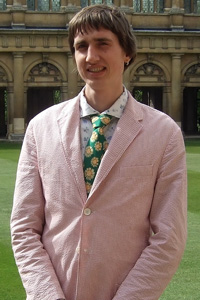Academic edge in science, math garners Goldwaters
By Rachel CromidasSecond-year in the College
 Hannes Schimmelpfennig |
|
College students Hannah Alpert and Hannes Schimmelpfennig have won Goldwater scholarships from the Barry M. Goldwater Scholarship and Excellence in Education Foundation for their achievements and potential in the fields of math and science.
Alpert is a second-year majoring in mathematics, and Schimmelpfennig is a third-year pursuing a double major in physics and mathematics.
“Both Hannah and Hannes are very talented, young researchers whose promise has been recognized by the committee,” said Paul Anderson, College Scholarships Advisor. “Over the past 15 years, students in the College have received 46 Goldwater scholarships—that’s basically 70 percent of the time,” Anderson said. “We rely on College advisors, informational meetings and the input of faculty to tell promising candidates about the scholarship and encourage them to apply.”
One such faculty member was Paul Sally, Professor in Mathematics and the College and Director of the Undergraduate Mathematics Studies program; he alerted the University’s selection committee to both Alpert and Schimmelpfennig’s achievements.
“Hannah is far and away the brightest second-year student in mathematics now,” said Sally, who taught Alpert in his Honors Analysis class. “She has all the potential and knowledge to become a first-class research mathematician, even at this young age.”
When Alpert applied last fall, she wrote her scholarship application essay about a project she researched during high school on topological graph theory.
“The project was about drawing triangles on the surface of a donut … so that each triangle would have three edges that were all different colors,” she explained. “We didn’t figure it out completely, but we showed that for a certain class of triangulations, you can always figure out how to assign colors to all of the edges so that each triangle has three different colored edges.”
“Math is really big, and there are a lot of areas I don’t know anything about,” Alpert said, but graph theory is a field that is very accessible to younger students. “It’s very easy to pose accessible problems that people haven’t studied before, so a lot of undergraduate research is about that.”
Alpert plans to spend her summer participating in an undergraduate research program in Duluth, Minn.
Currently studying at Cambridge, Schimmelpfennig was selected for the study abroad opportunity by faculty members in the Department of Physics.
“My experience here is a major part of my undergraduate education in theoretical physics,” he said. “Studying in Cambridge is more independent than at Chicago. You have to find your way through the material largely on your own and make sure you are prepared for exams at the end of the year, which count for 70 percent of your overall mark. I think it is a good way to get used to independent studying and responsibility.”
Schimmelpfennig said his future goals are to attend graduate school for physics in pursuit of a research career as a theoretical physicist. He plans to focus on quantum field theory, an area of physics he will continue to explore during his fourth year in the College. He has worked on dark matter detection with Juan Collar, Associate Professor in Physics and the College, before he came to Cambridge. At Cambridge, he has written a research review paper under the supervision of James Stirling, the Jacksonian professor of natural philosophy in Cambridge’s physics department, on “Convergence of Perturbation Series in Quantum Field Theory.”
“During his year with us in Cambridge, Hannes has undertaken the full physics course load alongside our third-year students. It’s an enormously challenging thing to do to just drop into a completely different education system for the year and find yourself among some of the smartest kids in the UK,” Stirling said. “It doesn’t surprise me that he’s been winning scholarships because he is an outstanding student.”
He will spend the summer doing research on Lattice QCD, an active new area within quantum field theory, at the Thomas Jefferson Laboratory in Virginia.
“Hannes has not only been marked by the physics department [to study abroad]; he has been actively involved in research since he stepped foot on campus,” Anderson said. “In the sciences, having a good research profile is an essential component of being picked for the Goldwater scholarship.”
Congress established the Goldwater scholarships in 1986. They are awarded annually to second- and third-year students who are pursuing careers in the sciences, mathematics or engineering. The scholarship provides winners with $7,500 per school year to fund college expenses while the students remain in College.
“But more important than the monetary part, this award is meant to recognize the most promising young scientists and mathematicians this country has to offer,” Anderson said. “It’s really an honor to have two winners this year.”
![[Chronicle]](/images/sidebar_header_oct06.gif)